Halo Effect in Management: Impact on Decision Making Process
VerifiedAdded on 2022/08/09
|10
|2048
|265
AI Summary
This report analyses the Halo effect within the managerial practice and its impact on the decision-making process. The analysis is supported by the key arguments from the book “The halo effect” by Phil Rosenzweig.
Contribute Materials
Your contribution can guide someone’s learning journey. Share your
documents today.
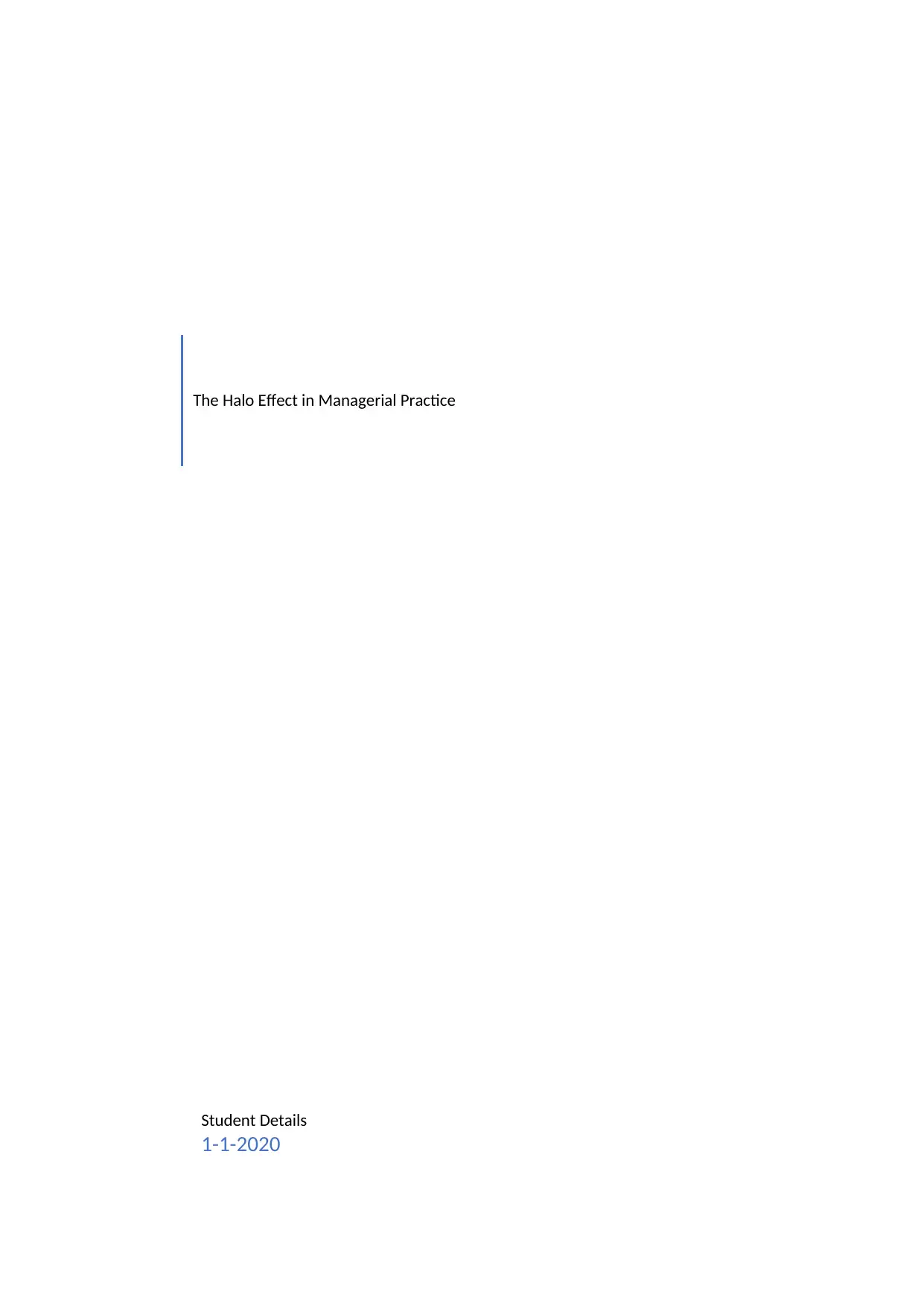
The Halo Effect in Managerial Practice
Student Details
1-1-2020
Student Details
1-1-2020
Secure Best Marks with AI Grader
Need help grading? Try our AI Grader for instant feedback on your assignments.
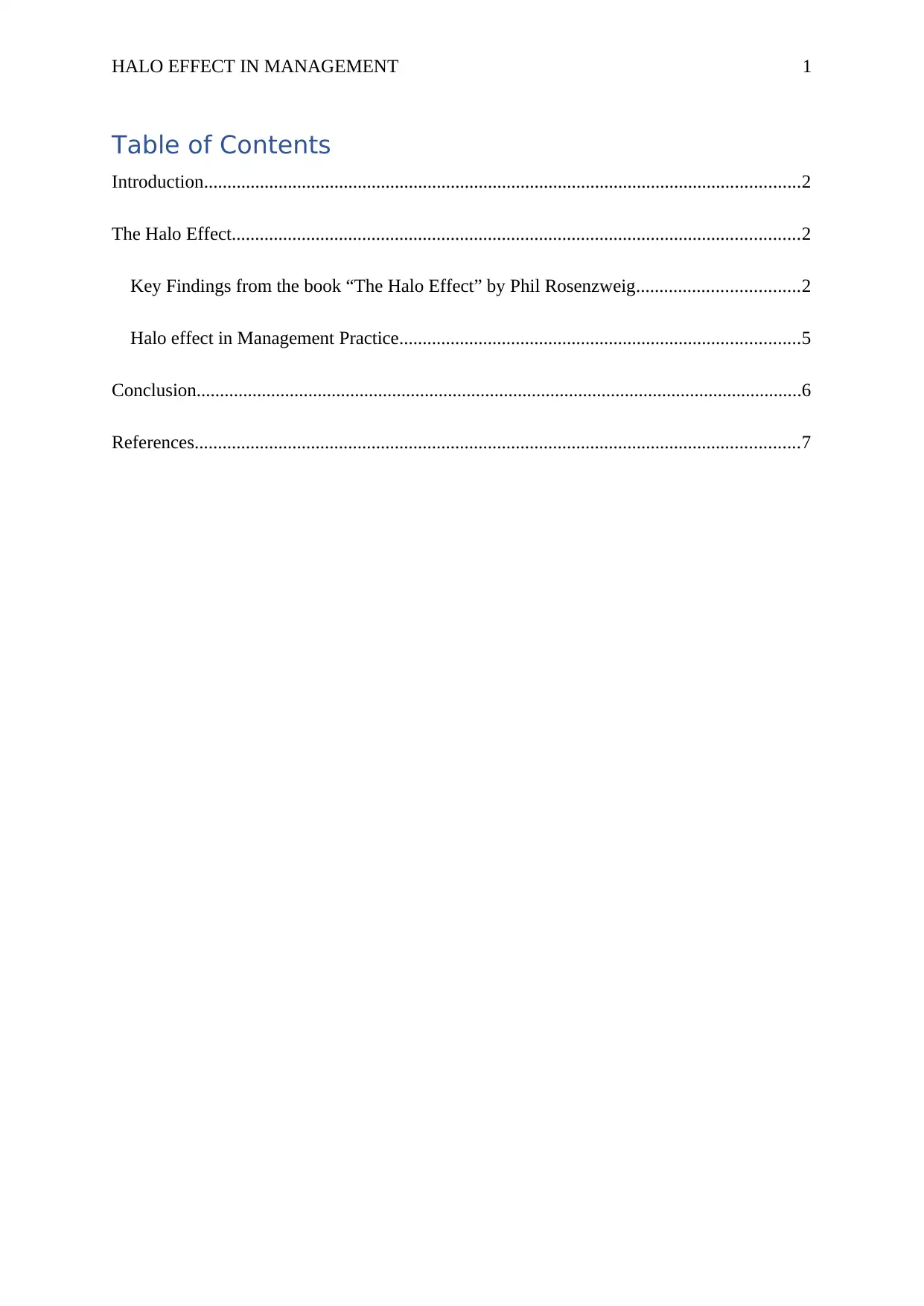
HALO EFFECT IN MANAGEMENT 1
Table of Contents
Introduction................................................................................................................................2
The Halo Effect..........................................................................................................................2
Key Findings from the book “The Halo Effect” by Phil Rosenzweig...................................2
Halo effect in Management Practice......................................................................................5
Conclusion..................................................................................................................................6
References..................................................................................................................................7
Table of Contents
Introduction................................................................................................................................2
The Halo Effect..........................................................................................................................2
Key Findings from the book “The Halo Effect” by Phil Rosenzweig...................................2
Halo effect in Management Practice......................................................................................5
Conclusion..................................................................................................................................6
References..................................................................................................................................7
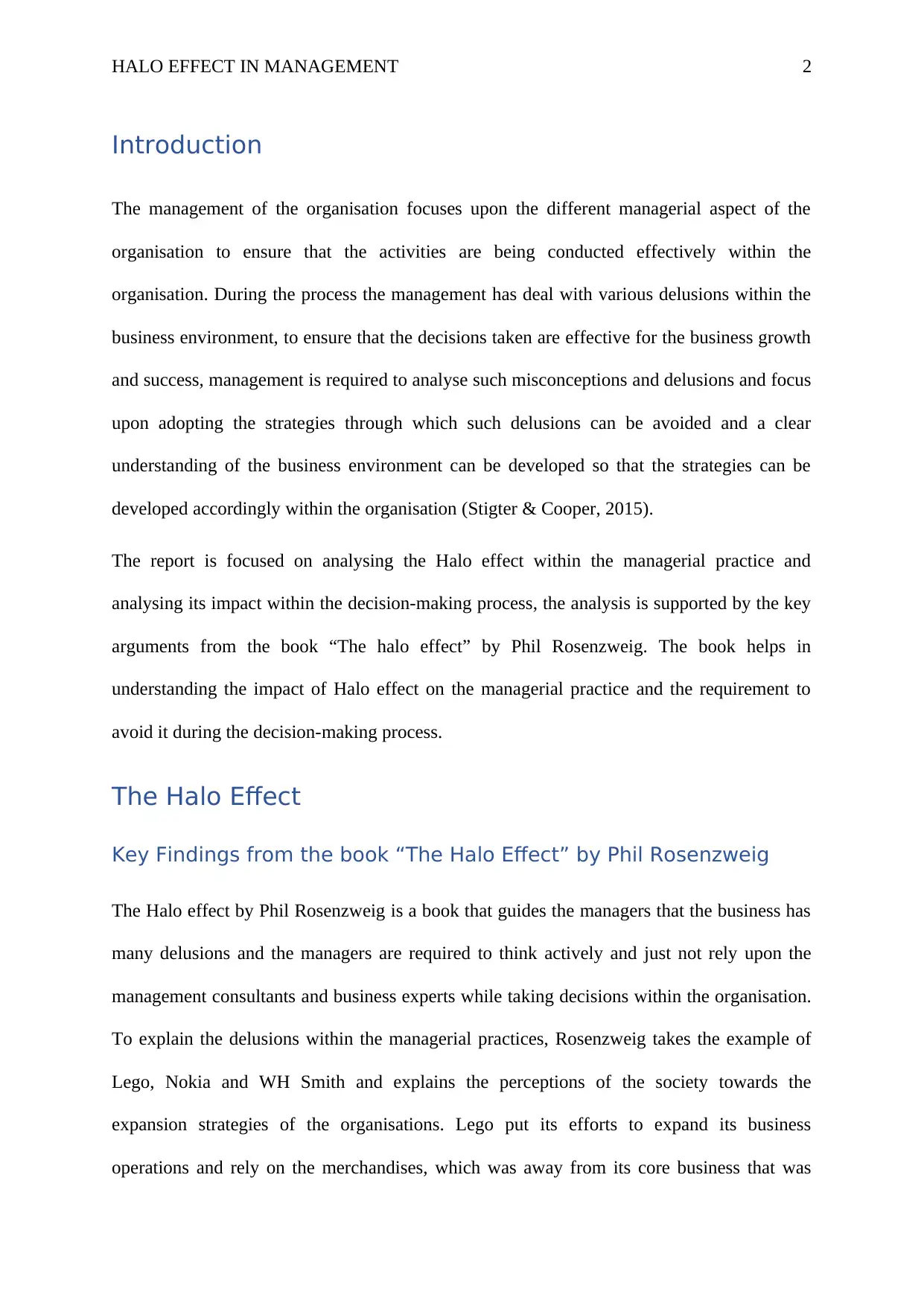
HALO EFFECT IN MANAGEMENT 2
Introduction
The management of the organisation focuses upon the different managerial aspect of the
organisation to ensure that the activities are being conducted effectively within the
organisation. During the process the management has deal with various delusions within the
business environment, to ensure that the decisions taken are effective for the business growth
and success, management is required to analyse such misconceptions and delusions and focus
upon adopting the strategies through which such delusions can be avoided and a clear
understanding of the business environment can be developed so that the strategies can be
developed accordingly within the organisation (Stigter & Cooper, 2015).
The report is focused on analysing the Halo effect within the managerial practice and
analysing its impact within the decision-making process, the analysis is supported by the key
arguments from the book “The halo effect” by Phil Rosenzweig. The book helps in
understanding the impact of Halo effect on the managerial practice and the requirement to
avoid it during the decision-making process.
The Halo Effect
Key Findings from the book “The Halo Effect” by Phil Rosenzweig
The Halo effect by Phil Rosenzweig is a book that guides the managers that the business has
many delusions and the managers are required to think actively and just not rely upon the
management consultants and business experts while taking decisions within the organisation.
To explain the delusions within the managerial practices, Rosenzweig takes the example of
Lego, Nokia and WH Smith and explains the perceptions of the society towards the
expansion strategies of the organisations. Lego put its efforts to expand its business
operations and rely on the merchandises, which was away from its core business that was
Introduction
The management of the organisation focuses upon the different managerial aspect of the
organisation to ensure that the activities are being conducted effectively within the
organisation. During the process the management has deal with various delusions within the
business environment, to ensure that the decisions taken are effective for the business growth
and success, management is required to analyse such misconceptions and delusions and focus
upon adopting the strategies through which such delusions can be avoided and a clear
understanding of the business environment can be developed so that the strategies can be
developed accordingly within the organisation (Stigter & Cooper, 2015).
The report is focused on analysing the Halo effect within the managerial practice and
analysing its impact within the decision-making process, the analysis is supported by the key
arguments from the book “The halo effect” by Phil Rosenzweig. The book helps in
understanding the impact of Halo effect on the managerial practice and the requirement to
avoid it during the decision-making process.
The Halo Effect
Key Findings from the book “The Halo Effect” by Phil Rosenzweig
The Halo effect by Phil Rosenzweig is a book that guides the managers that the business has
many delusions and the managers are required to think actively and just not rely upon the
management consultants and business experts while taking decisions within the organisation.
To explain the delusions within the managerial practices, Rosenzweig takes the example of
Lego, Nokia and WH Smith and explains the perceptions of the society towards the
expansion strategies of the organisations. Lego put its efforts to expand its business
operations and rely on the merchandises, which was away from its core business that was
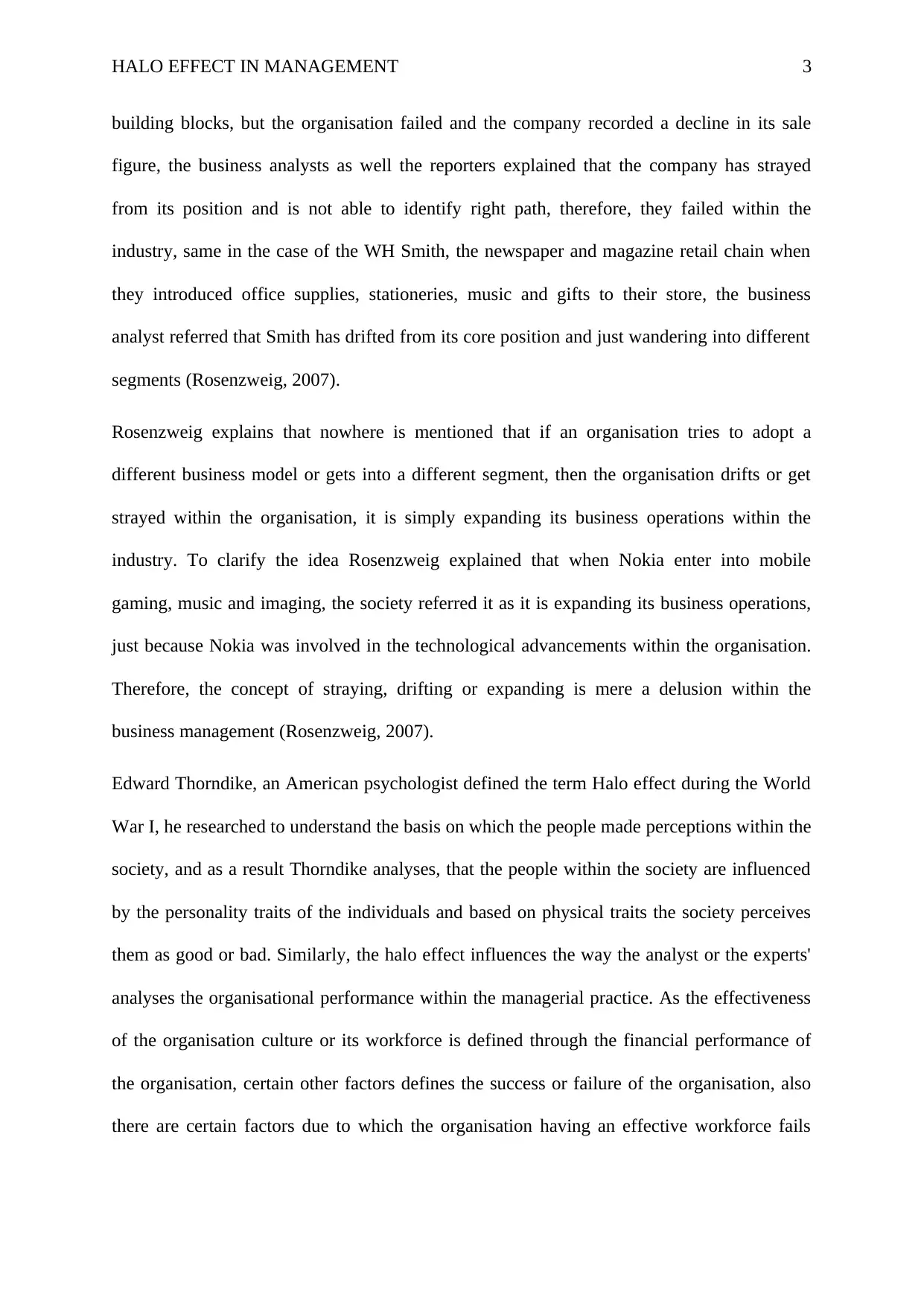
HALO EFFECT IN MANAGEMENT 3
building blocks, but the organisation failed and the company recorded a decline in its sale
figure, the business analysts as well the reporters explained that the company has strayed
from its position and is not able to identify right path, therefore, they failed within the
industry, same in the case of the WH Smith, the newspaper and magazine retail chain when
they introduced office supplies, stationeries, music and gifts to their store, the business
analyst referred that Smith has drifted from its core position and just wandering into different
segments (Rosenzweig, 2007).
Rosenzweig explains that nowhere is mentioned that if an organisation tries to adopt a
different business model or gets into a different segment, then the organisation drifts or get
strayed within the organisation, it is simply expanding its business operations within the
industry. To clarify the idea Rosenzweig explained that when Nokia enter into mobile
gaming, music and imaging, the society referred it as it is expanding its business operations,
just because Nokia was involved in the technological advancements within the organisation.
Therefore, the concept of straying, drifting or expanding is mere a delusion within the
business management (Rosenzweig, 2007).
Edward Thorndike, an American psychologist defined the term Halo effect during the World
War I, he researched to understand the basis on which the people made perceptions within the
society, and as a result Thorndike analyses, that the people within the society are influenced
by the personality traits of the individuals and based on physical traits the society perceives
them as good or bad. Similarly, the halo effect influences the way the analyst or the experts'
analyses the organisational performance within the managerial practice. As the effectiveness
of the organisation culture or its workforce is defined through the financial performance of
the organisation, certain other factors defines the success or failure of the organisation, also
there are certain factors due to which the organisation having an effective workforce fails
building blocks, but the organisation failed and the company recorded a decline in its sale
figure, the business analysts as well the reporters explained that the company has strayed
from its position and is not able to identify right path, therefore, they failed within the
industry, same in the case of the WH Smith, the newspaper and magazine retail chain when
they introduced office supplies, stationeries, music and gifts to their store, the business
analyst referred that Smith has drifted from its core position and just wandering into different
segments (Rosenzweig, 2007).
Rosenzweig explains that nowhere is mentioned that if an organisation tries to adopt a
different business model or gets into a different segment, then the organisation drifts or get
strayed within the organisation, it is simply expanding its business operations within the
industry. To clarify the idea Rosenzweig explained that when Nokia enter into mobile
gaming, music and imaging, the society referred it as it is expanding its business operations,
just because Nokia was involved in the technological advancements within the organisation.
Therefore, the concept of straying, drifting or expanding is mere a delusion within the
business management (Rosenzweig, 2007).
Edward Thorndike, an American psychologist defined the term Halo effect during the World
War I, he researched to understand the basis on which the people made perceptions within the
society, and as a result Thorndike analyses, that the people within the society are influenced
by the personality traits of the individuals and based on physical traits the society perceives
them as good or bad. Similarly, the halo effect influences the way the analyst or the experts'
analyses the organisational performance within the managerial practice. As the effectiveness
of the organisation culture or its workforce is defined through the financial performance of
the organisation, certain other factors defines the success or failure of the organisation, also
there are certain factors due to which the organisation having an effective workforce fails
Secure Best Marks with AI Grader
Need help grading? Try our AI Grader for instant feedback on your assignments.
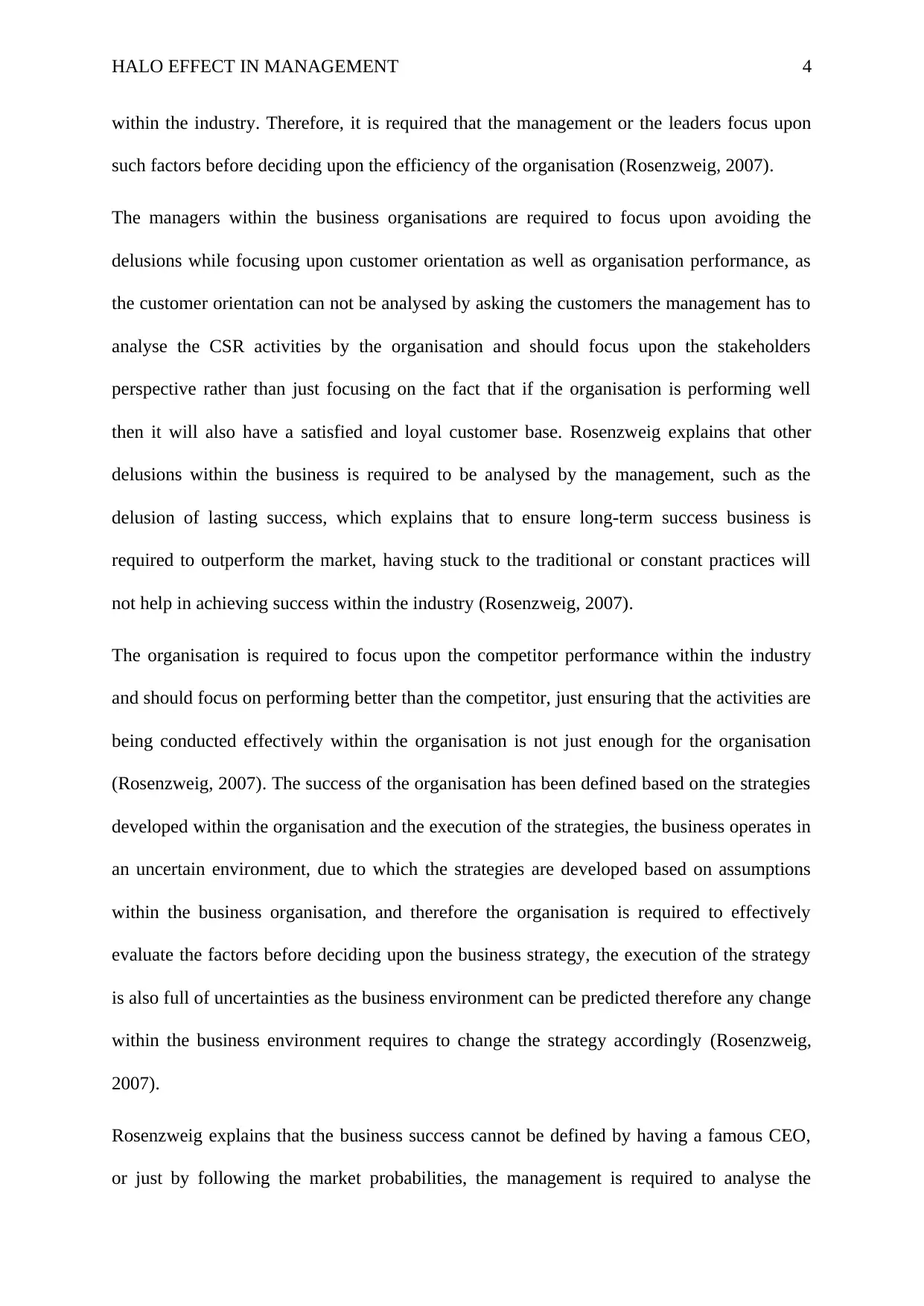
HALO EFFECT IN MANAGEMENT 4
within the industry. Therefore, it is required that the management or the leaders focus upon
such factors before deciding upon the efficiency of the organisation (Rosenzweig, 2007).
The managers within the business organisations are required to focus upon avoiding the
delusions while focusing upon customer orientation as well as organisation performance, as
the customer orientation can not be analysed by asking the customers the management has to
analyse the CSR activities by the organisation and should focus upon the stakeholders
perspective rather than just focusing on the fact that if the organisation is performing well
then it will also have a satisfied and loyal customer base. Rosenzweig explains that other
delusions within the business is required to be analysed by the management, such as the
delusion of lasting success, which explains that to ensure long-term success business is
required to outperform the market, having stuck to the traditional or constant practices will
not help in achieving success within the industry (Rosenzweig, 2007).
The organisation is required to focus upon the competitor performance within the industry
and should focus on performing better than the competitor, just ensuring that the activities are
being conducted effectively within the organisation is not just enough for the organisation
(Rosenzweig, 2007). The success of the organisation has been defined based on the strategies
developed within the organisation and the execution of the strategies, the business operates in
an uncertain environment, due to which the strategies are developed based on assumptions
within the business organisation, and therefore the organisation is required to effectively
evaluate the factors before deciding upon the business strategy, the execution of the strategy
is also full of uncertainties as the business environment can be predicted therefore any change
within the business environment requires to change the strategy accordingly (Rosenzweig,
2007).
Rosenzweig explains that the business success cannot be defined by having a famous CEO,
or just by following the market probabilities, the management is required to analyse the
within the industry. Therefore, it is required that the management or the leaders focus upon
such factors before deciding upon the efficiency of the organisation (Rosenzweig, 2007).
The managers within the business organisations are required to focus upon avoiding the
delusions while focusing upon customer orientation as well as organisation performance, as
the customer orientation can not be analysed by asking the customers the management has to
analyse the CSR activities by the organisation and should focus upon the stakeholders
perspective rather than just focusing on the fact that if the organisation is performing well
then it will also have a satisfied and loyal customer base. Rosenzweig explains that other
delusions within the business is required to be analysed by the management, such as the
delusion of lasting success, which explains that to ensure long-term success business is
required to outperform the market, having stuck to the traditional or constant practices will
not help in achieving success within the industry (Rosenzweig, 2007).
The organisation is required to focus upon the competitor performance within the industry
and should focus on performing better than the competitor, just ensuring that the activities are
being conducted effectively within the organisation is not just enough for the organisation
(Rosenzweig, 2007). The success of the organisation has been defined based on the strategies
developed within the organisation and the execution of the strategies, the business operates in
an uncertain environment, due to which the strategies are developed based on assumptions
within the business organisation, and therefore the organisation is required to effectively
evaluate the factors before deciding upon the business strategy, the execution of the strategy
is also full of uncertainties as the business environment can be predicted therefore any change
within the business environment requires to change the strategy accordingly (Rosenzweig,
2007).
Rosenzweig explains that the business success cannot be defined by having a famous CEO,
or just by following the market probabilities, the management is required to analyse the
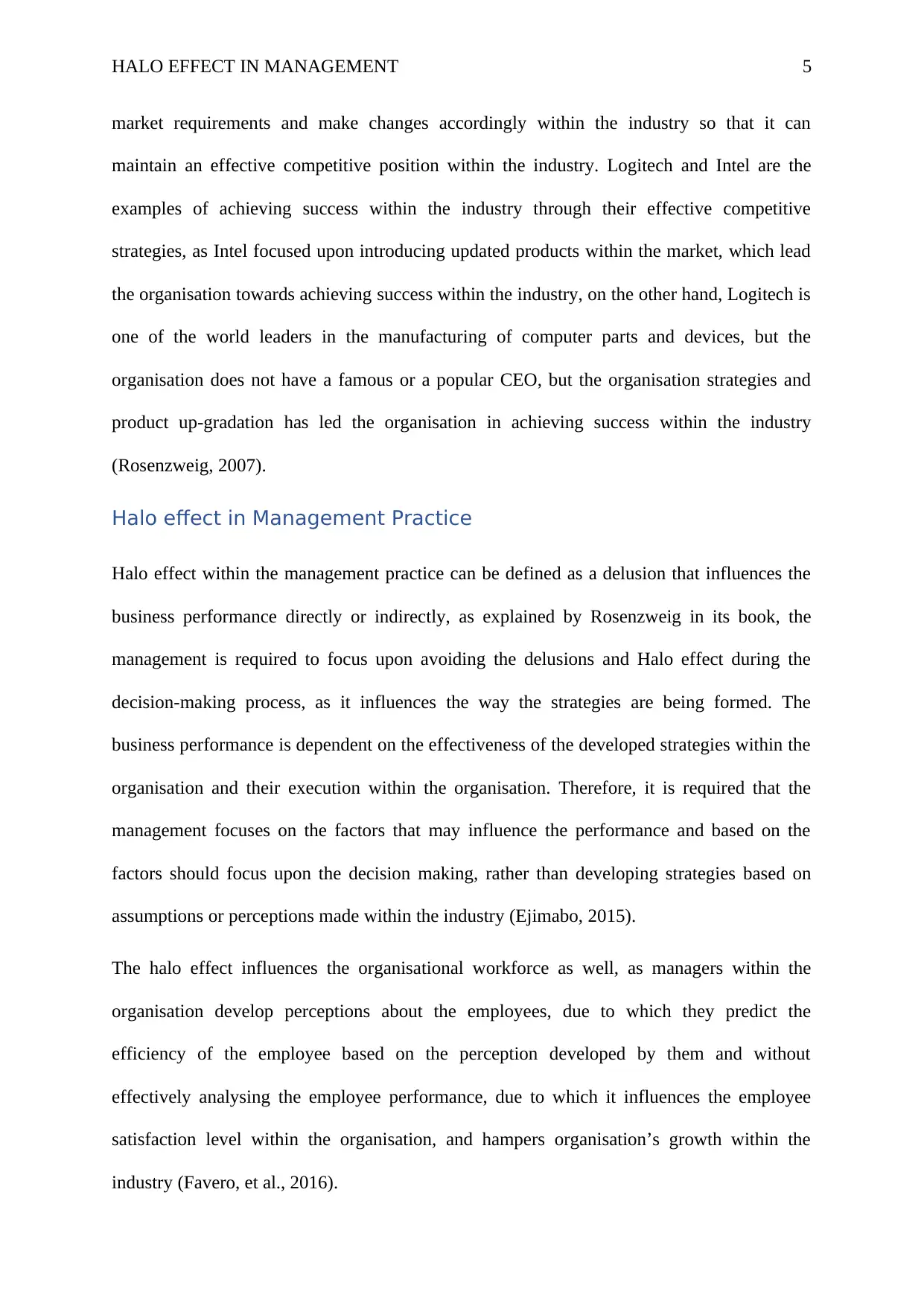
HALO EFFECT IN MANAGEMENT 5
market requirements and make changes accordingly within the industry so that it can
maintain an effective competitive position within the industry. Logitech and Intel are the
examples of achieving success within the industry through their effective competitive
strategies, as Intel focused upon introducing updated products within the market, which lead
the organisation towards achieving success within the industry, on the other hand, Logitech is
one of the world leaders in the manufacturing of computer parts and devices, but the
organisation does not have a famous or a popular CEO, but the organisation strategies and
product up-gradation has led the organisation in achieving success within the industry
(Rosenzweig, 2007).
Halo effect in Management Practice
Halo effect within the management practice can be defined as a delusion that influences the
business performance directly or indirectly, as explained by Rosenzweig in its book, the
management is required to focus upon avoiding the delusions and Halo effect during the
decision-making process, as it influences the way the strategies are being formed. The
business performance is dependent on the effectiveness of the developed strategies within the
organisation and their execution within the organisation. Therefore, it is required that the
management focuses on the factors that may influence the performance and based on the
factors should focus upon the decision making, rather than developing strategies based on
assumptions or perceptions made within the industry (Ejimabo, 2015).
The halo effect influences the organisational workforce as well, as managers within the
organisation develop perceptions about the employees, due to which they predict the
efficiency of the employee based on the perception developed by them and without
effectively analysing the employee performance, due to which it influences the employee
satisfaction level within the organisation, and hampers organisation’s growth within the
industry (Favero, et al., 2016).
market requirements and make changes accordingly within the industry so that it can
maintain an effective competitive position within the industry. Logitech and Intel are the
examples of achieving success within the industry through their effective competitive
strategies, as Intel focused upon introducing updated products within the market, which lead
the organisation towards achieving success within the industry, on the other hand, Logitech is
one of the world leaders in the manufacturing of computer parts and devices, but the
organisation does not have a famous or a popular CEO, but the organisation strategies and
product up-gradation has led the organisation in achieving success within the industry
(Rosenzweig, 2007).
Halo effect in Management Practice
Halo effect within the management practice can be defined as a delusion that influences the
business performance directly or indirectly, as explained by Rosenzweig in its book, the
management is required to focus upon avoiding the delusions and Halo effect during the
decision-making process, as it influences the way the strategies are being formed. The
business performance is dependent on the effectiveness of the developed strategies within the
organisation and their execution within the organisation. Therefore, it is required that the
management focuses on the factors that may influence the performance and based on the
factors should focus upon the decision making, rather than developing strategies based on
assumptions or perceptions made within the industry (Ejimabo, 2015).
The halo effect influences the organisational workforce as well, as managers within the
organisation develop perceptions about the employees, due to which they predict the
efficiency of the employee based on the perception developed by them and without
effectively analysing the employee performance, due to which it influences the employee
satisfaction level within the organisation, and hampers organisation’s growth within the
industry (Favero, et al., 2016).
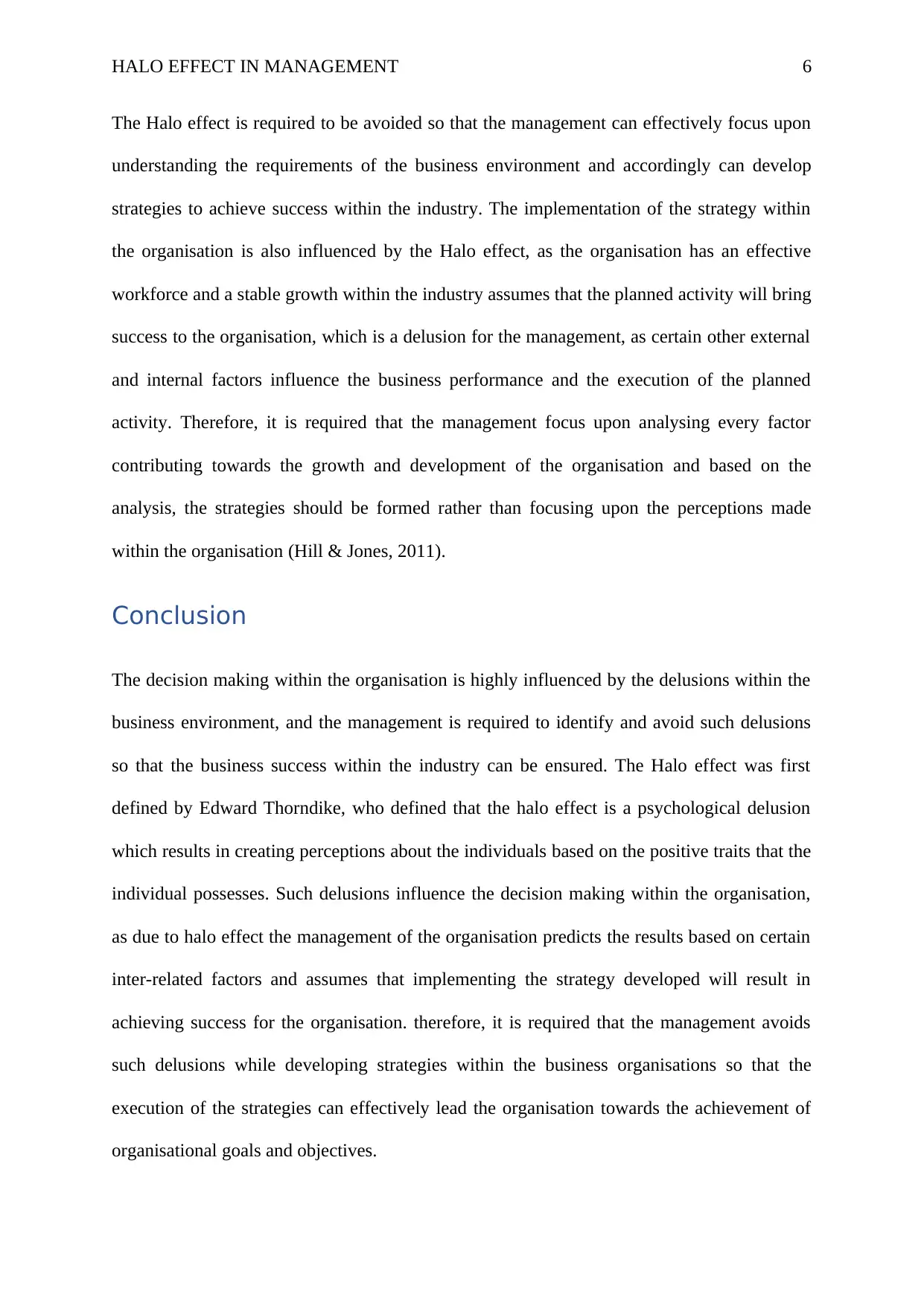
HALO EFFECT IN MANAGEMENT 6
The Halo effect is required to be avoided so that the management can effectively focus upon
understanding the requirements of the business environment and accordingly can develop
strategies to achieve success within the industry. The implementation of the strategy within
the organisation is also influenced by the Halo effect, as the organisation has an effective
workforce and a stable growth within the industry assumes that the planned activity will bring
success to the organisation, which is a delusion for the management, as certain other external
and internal factors influence the business performance and the execution of the planned
activity. Therefore, it is required that the management focus upon analysing every factor
contributing towards the growth and development of the organisation and based on the
analysis, the strategies should be formed rather than focusing upon the perceptions made
within the organisation (Hill & Jones, 2011).
Conclusion
The decision making within the organisation is highly influenced by the delusions within the
business environment, and the management is required to identify and avoid such delusions
so that the business success within the industry can be ensured. The Halo effect was first
defined by Edward Thorndike, who defined that the halo effect is a psychological delusion
which results in creating perceptions about the individuals based on the positive traits that the
individual possesses. Such delusions influence the decision making within the organisation,
as due to halo effect the management of the organisation predicts the results based on certain
inter-related factors and assumes that implementing the strategy developed will result in
achieving success for the organisation. therefore, it is required that the management avoids
such delusions while developing strategies within the business organisations so that the
execution of the strategies can effectively lead the organisation towards the achievement of
organisational goals and objectives.
The Halo effect is required to be avoided so that the management can effectively focus upon
understanding the requirements of the business environment and accordingly can develop
strategies to achieve success within the industry. The implementation of the strategy within
the organisation is also influenced by the Halo effect, as the organisation has an effective
workforce and a stable growth within the industry assumes that the planned activity will bring
success to the organisation, which is a delusion for the management, as certain other external
and internal factors influence the business performance and the execution of the planned
activity. Therefore, it is required that the management focus upon analysing every factor
contributing towards the growth and development of the organisation and based on the
analysis, the strategies should be formed rather than focusing upon the perceptions made
within the organisation (Hill & Jones, 2011).
Conclusion
The decision making within the organisation is highly influenced by the delusions within the
business environment, and the management is required to identify and avoid such delusions
so that the business success within the industry can be ensured. The Halo effect was first
defined by Edward Thorndike, who defined that the halo effect is a psychological delusion
which results in creating perceptions about the individuals based on the positive traits that the
individual possesses. Such delusions influence the decision making within the organisation,
as due to halo effect the management of the organisation predicts the results based on certain
inter-related factors and assumes that implementing the strategy developed will result in
achieving success for the organisation. therefore, it is required that the management avoids
such delusions while developing strategies within the business organisations so that the
execution of the strategies can effectively lead the organisation towards the achievement of
organisational goals and objectives.
Paraphrase This Document
Need a fresh take? Get an instant paraphrase of this document with our AI Paraphraser
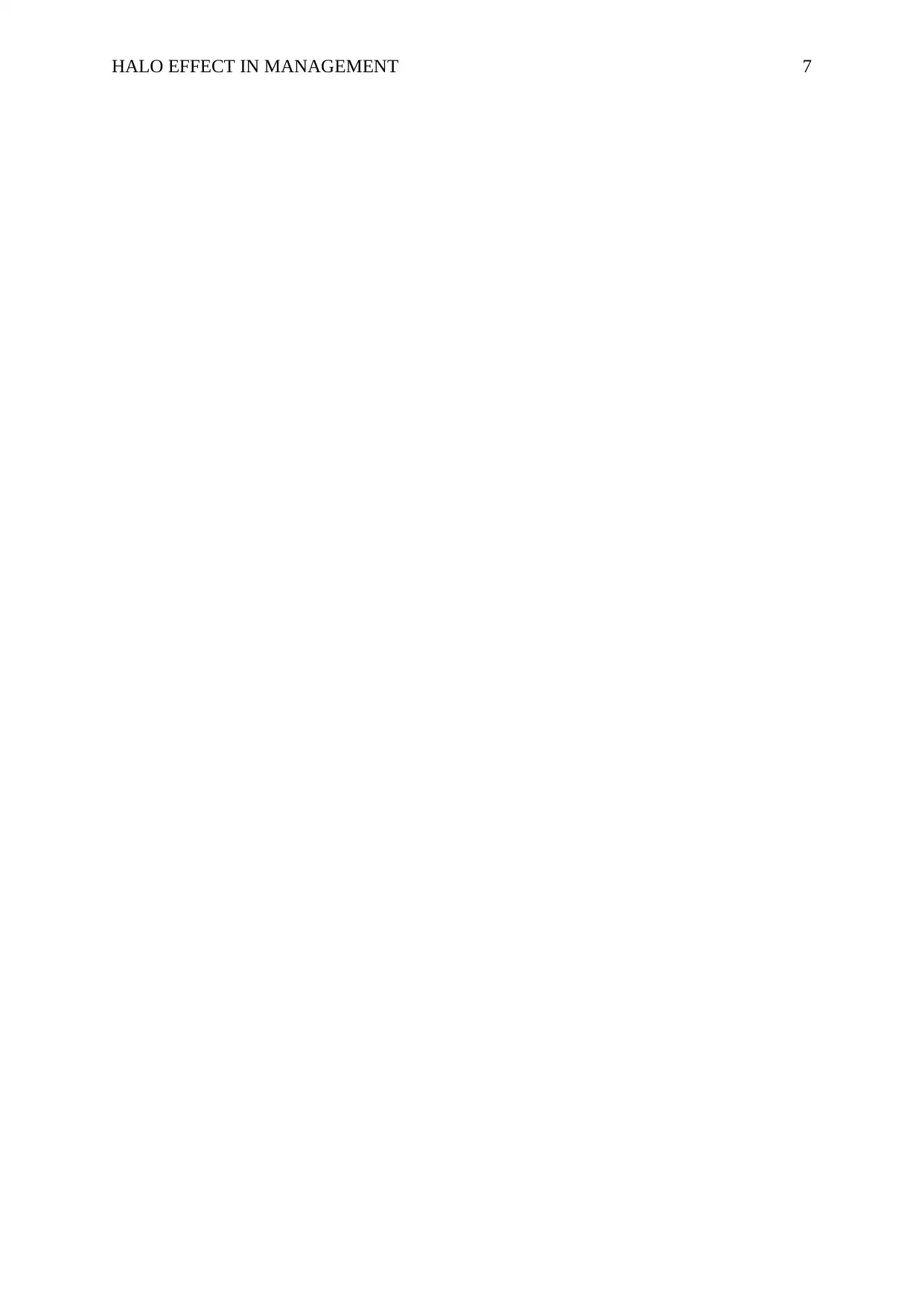
HALO EFFECT IN MANAGEMENT 7
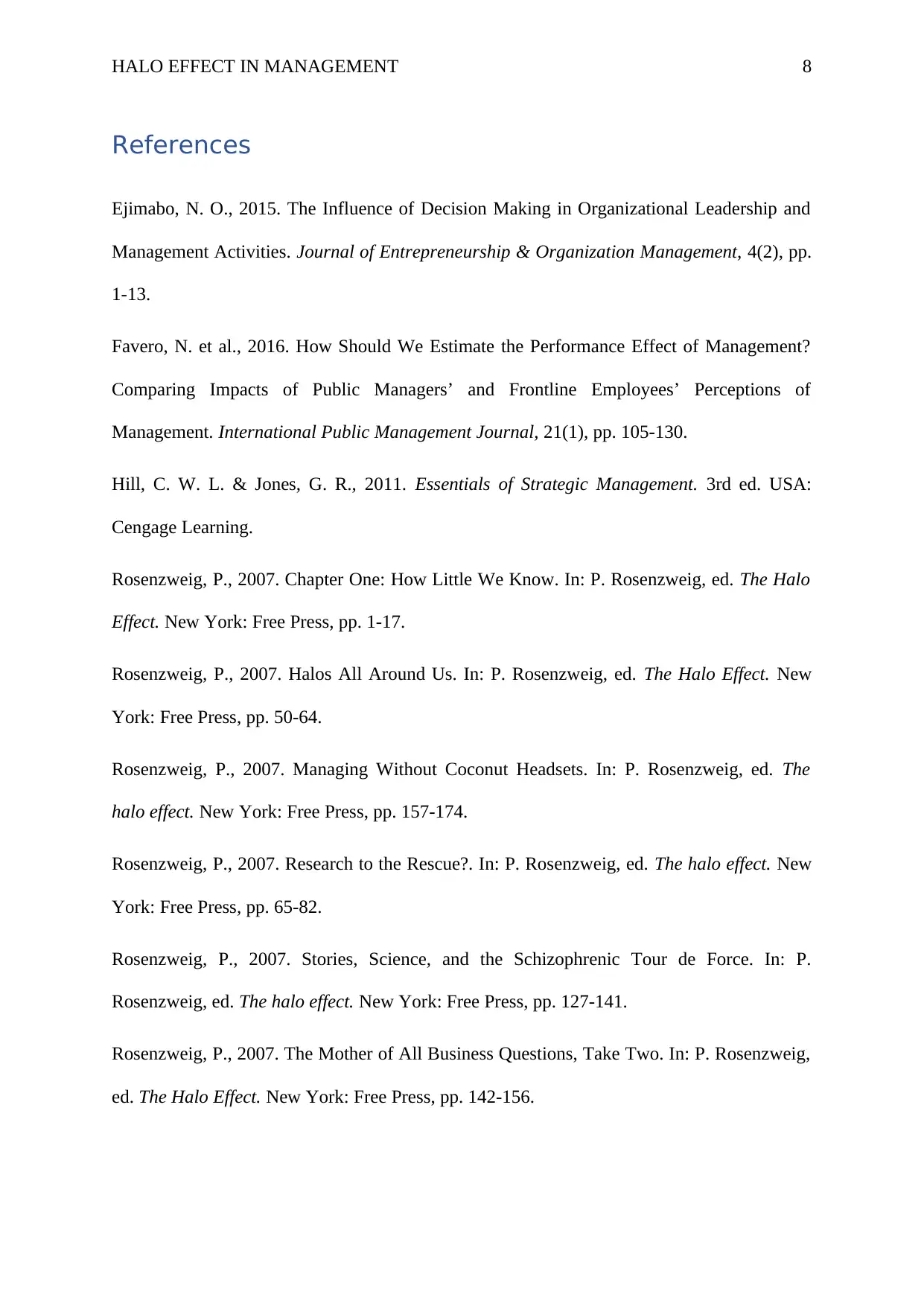
HALO EFFECT IN MANAGEMENT 8
References
Ejimabo, N. O., 2015. The Influence of Decision Making in Organizational Leadership and
Management Activities. Journal of Entrepreneurship & Organization Management, 4(2), pp.
1-13.
Favero, N. et al., 2016. How Should We Estimate the Performance Effect of Management?
Comparing Impacts of Public Managers’ and Frontline Employees’ Perceptions of
Management. International Public Management Journal, 21(1), pp. 105-130.
Hill, C. W. L. & Jones, G. R., 2011. Essentials of Strategic Management. 3rd ed. USA:
Cengage Learning.
Rosenzweig, P., 2007. Chapter One: How Little We Know. In: P. Rosenzweig, ed. The Halo
Effect. New York: Free Press, pp. 1-17.
Rosenzweig, P., 2007. Halos All Around Us. In: P. Rosenzweig, ed. The Halo Effect. New
York: Free Press, pp. 50-64.
Rosenzweig, P., 2007. Managing Without Coconut Headsets. In: P. Rosenzweig, ed. The
halo effect. New York: Free Press, pp. 157-174.
Rosenzweig, P., 2007. Research to the Rescue?. In: P. Rosenzweig, ed. The halo effect. New
York: Free Press, pp. 65-82.
Rosenzweig, P., 2007. Stories, Science, and the Schizophrenic Tour de Force. In: P.
Rosenzweig, ed. The halo effect. New York: Free Press, pp. 127-141.
Rosenzweig, P., 2007. The Mother of All Business Questions, Take Two. In: P. Rosenzweig,
ed. The Halo Effect. New York: Free Press, pp. 142-156.
References
Ejimabo, N. O., 2015. The Influence of Decision Making in Organizational Leadership and
Management Activities. Journal of Entrepreneurship & Organization Management, 4(2), pp.
1-13.
Favero, N. et al., 2016. How Should We Estimate the Performance Effect of Management?
Comparing Impacts of Public Managers’ and Frontline Employees’ Perceptions of
Management. International Public Management Journal, 21(1), pp. 105-130.
Hill, C. W. L. & Jones, G. R., 2011. Essentials of Strategic Management. 3rd ed. USA:
Cengage Learning.
Rosenzweig, P., 2007. Chapter One: How Little We Know. In: P. Rosenzweig, ed. The Halo
Effect. New York: Free Press, pp. 1-17.
Rosenzweig, P., 2007. Halos All Around Us. In: P. Rosenzweig, ed. The Halo Effect. New
York: Free Press, pp. 50-64.
Rosenzweig, P., 2007. Managing Without Coconut Headsets. In: P. Rosenzweig, ed. The
halo effect. New York: Free Press, pp. 157-174.
Rosenzweig, P., 2007. Research to the Rescue?. In: P. Rosenzweig, ed. The halo effect. New
York: Free Press, pp. 65-82.
Rosenzweig, P., 2007. Stories, Science, and the Schizophrenic Tour de Force. In: P.
Rosenzweig, ed. The halo effect. New York: Free Press, pp. 127-141.
Rosenzweig, P., 2007. The Mother of All Business Questions, Take Two. In: P. Rosenzweig,
ed. The Halo Effect. New York: Free Press, pp. 142-156.
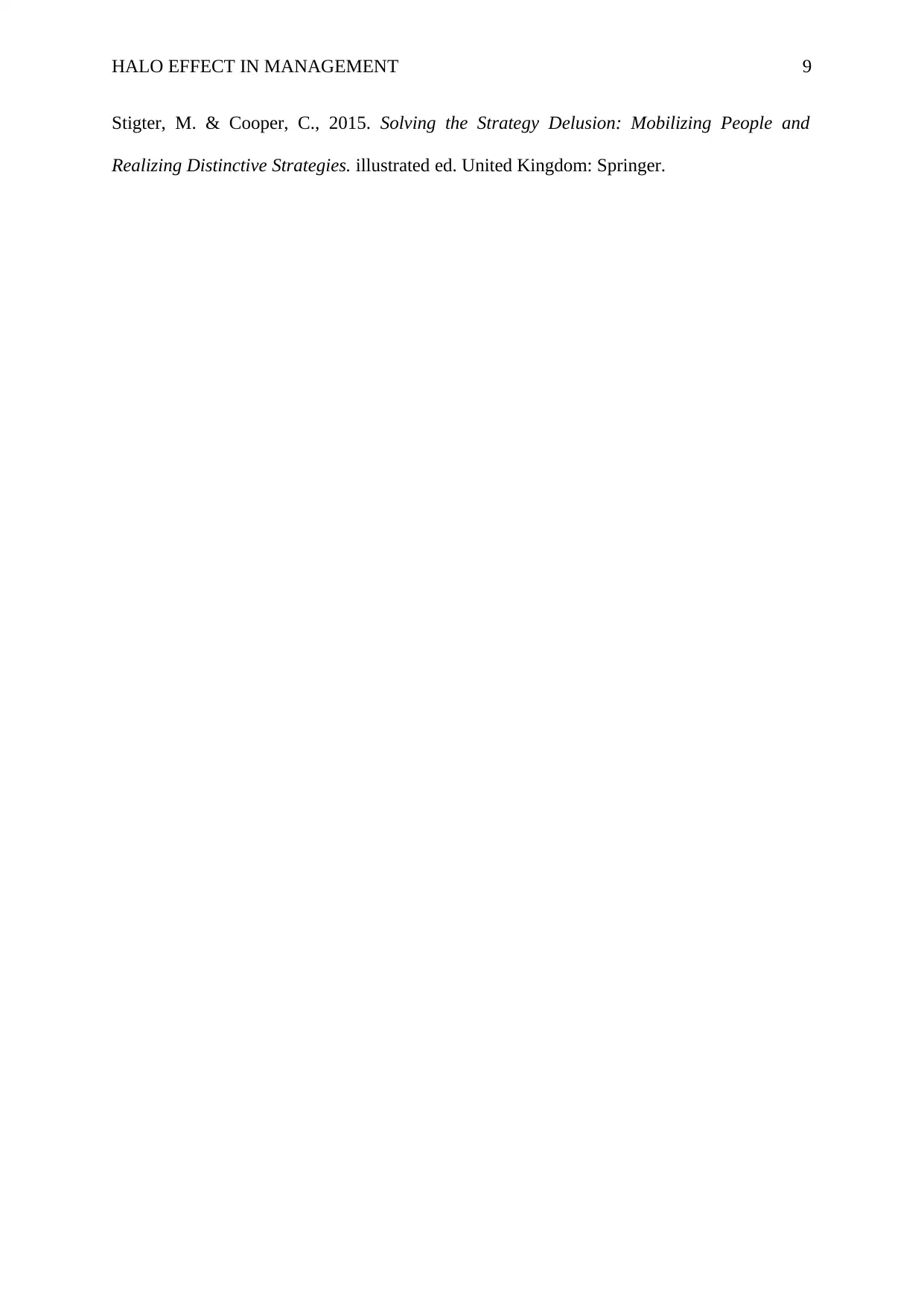
HALO EFFECT IN MANAGEMENT 9
Stigter, M. & Cooper, C., 2015. Solving the Strategy Delusion: Mobilizing People and
Realizing Distinctive Strategies. illustrated ed. United Kingdom: Springer.
Stigter, M. & Cooper, C., 2015. Solving the Strategy Delusion: Mobilizing People and
Realizing Distinctive Strategies. illustrated ed. United Kingdom: Springer.
1 out of 10
Your All-in-One AI-Powered Toolkit for Academic Success.
+13062052269
info@desklib.com
Available 24*7 on WhatsApp / Email
![[object Object]](/_next/static/media/star-bottom.7253800d.svg)
Unlock your academic potential
© 2024 | Zucol Services PVT LTD | All rights reserved.